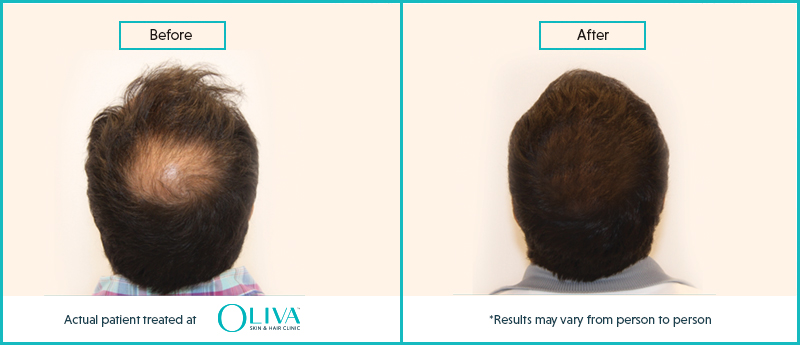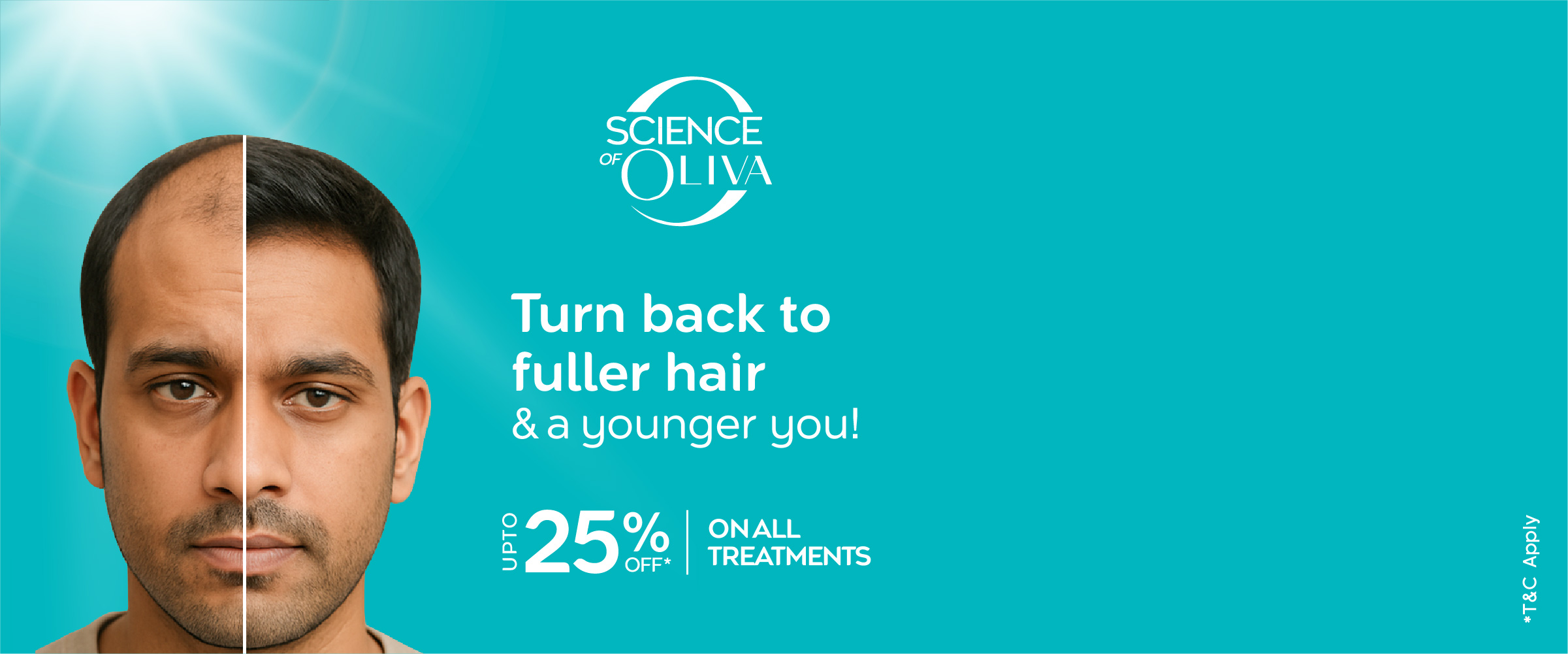Alopecia (Hair Loss): Types, Causes & Management Options
Highlights
- ● The medical term for hair loss is alopecia.
- ● A study identified that almost 58% of men between 30 and 50 years suffer from some form of alopecia.
- ● 12% of women between 20 and 29 years of age experience hair loss.
- ● Hereditary or genetic factors are the primary reasons for hair loss.
- ● Fortunately, with the recent advancements in trichology, doctors can treat even severe cases of hair loss.
What Is Hair Loss?
Alopecia refers to hair loss that may be partial or complete, localised or generalised due to external or internal factors. Typically, we lose roughly 100 hairs a day, but if you lose more than that (around 120-150 or more) or if you see specific areas of the scalp being affected, you must consult a trichologist immediately.
Hair loss can affect any part of the body, including the scalp. The most common form of hair loss is androgenetic alopecia or patterned hair loss, and it develops gradually with time. Hair loss can affect anyone, but androgenetic alopecia is affecting people as early as in their 20s to 30s.
Types Of Hair Loss:
Qualified trichologists categorise hair loss into the following types:
- Androgenetic Alopecia – It is a common form of hair loss that can affect both men and women as early as during teenage with the risk increasing with age.
- Male Pattern Baldness – Hair loss occurs in a well-defined pattern, beginning above both the temples. Over time, the hairline recedes to form a characteristic ‘M’ shape. Hair also thins at the crown (near the top of the head), often progressing to partial or complete baldness.
- Female Pattern Baldness – Here, the hair becomes thinner over the top of the head with the midline parting becoming more pronounced. However, the hairline does not recede. This type of hair loss in women rarely leads to total baldness.
- Telogen Effluvium – It is the most common form of diffuse hair loss that affects the scalp coverage adversely. It occurs around three months after a triggering event and is self-limiting, usually lasting for about six months.
- Alopecia Areata – It is a hair loss condition that causes discrete round bald patches appearing on different parts of the scalp with the remaining hairs on the head being entirely unaffected. However, it can eventually lead to total hair loss. It occurs when the immune system attacks and destroys healthy body tissue.
- Trichotillomania – It is a type of alopecia caused by the repeated pulling of hair. Doctors associate this type of alopecia with an impulse control disorder.
- Involutional Alopecia – It is a form of hair loss that occurs because of the natural ageing process. The primary cause of this form of hair loss is the shortening of the anagen (growth) phase of the hair growth cycle. In this case, hair does not grow as fast as it sheds.
- Scarring Alopecia – Also known as cicatricial alopecia, is a rare condition caused when inflammation or scarring due to various diseases hampers the scalp’s natural ability to grow hair.
Informative Resources:
- How To Treat Temple Hair Loss?
- What Are The Early Signs Of Hair Loss And Balding?
- How To Reduce Hair Loss?
- How To Stop Hair Thinning?
Pathophysiology:
Hair loss is a result of a disturbance to the hair growth cycle. Hair growth occurs in the following phases:–
- Anagen or the active growth phase (2 to 7 weeks)
- Catagen or the transition phase (1 to 2 weeks)
- Telogen or the resting phase (5 to 12 weeks)
On average, only 9 to 10% of hair is in the telogen phase on a healthy scalp. In androgenetic alopecia, there is progressive miniaturisation (thinning) of the hair, which causes increased scalp visibility. Also, the anagen phase shortens, and the telogen phase lengthens. Eventually, the hair sheds, leading to hair loss.
Must Watch:
Hair Loss Causes:
Several factors can trigger hair loss, including the following:
- Heredity – Positive family history can increase your chances of having androgenetic alopecia. Men may notice bald patches or a receding hairline, whereas women may observe thinning of hair at the parting and increased scalp visibility.
- Hormonal disorders – Hormonal imbalance during pregnancy or menopause trigger hair loss in women. Also, hormonal shifts due to the use of birth control pills, childbirth and hysterectomy can induce hair loss due to the shortening of the anagen phase. Insulin resistance can also result in hair loss. Men also suffer from hair loss due to hormonal imbalance.
- Poor lifestyle – Stress, improper diet, nutritional deficiencies, and poor lifestyle habits can cause hair loss.
- Medication – Use of chemotherapy to treat cancer leads to hair loss as a side effect.
- Tight hairstyles and chemical treatments – High-tension hairstyles such as tight ponytails may cause traction of hair follicles and lead to hair loss. Chemical treatments with the use of bleach, colour, and dye may lead to temporary hair loss.
- Other causes – Some other less known causes can include chronic illnesses related to thyroid disorders, lupus, and polycystic ovarian disease (PCOD). Crash diets, habits like nervous hair pulling or scalp rubbing, rapid weight loss, infections, allergies to hair dyes, hair cosmetics, conditions like Seborrheic dermatitis or Psoriasis of the scalp may trigger acute hair loss.
Signs And Symptoms:
- Excessive and consistent hair loss.
- Thinning of hair from the crown area.
- Appearance of bald patches that are usually circular.
- Sudden loss of hair due to fungal scalp infection accompanied with pain or itching.
- Patchy hair growth.
- A receding hairline in the form of the letter M.
Diagnosis:
Trichologists diagnose hair loss based on medical history, a detailed physical examination and trichoscopy. Also, your doctor may recommend a biopsy to ascertain the cause of severe hair loss in case of doubt and find a suitable treatment option.
Are You At Risk?
Usually, men with a family history of baldness are likely to suffer from the same. Women who are experiencing hormonal imbalances due to pregnancy, menopause, use of birth control pills or PCOD are also susceptible to having acute hair loss.
Prevention And Management:
Here are some simple tips to prevent hair loss:
- Avoid using harsh chemical hair products as well as heat styling tools such as straighteners and perming irons.
- Practice a healthy hair care routine and use a mild shampoo twice or thrice a week to keep your hair clean. The frequency of shampooing depends on your hair type and the exposure to dust and pollution.
- Eat a balanced diet rich in essential nutrients and vitamins such as iron, vitamin B12, Vitamin D, protein, and Vitamin E.
- Adopt a healthy lifestyle and keep stress at bay by exercising regularly or practising yoga or meditation.
- Avoid hairstyles that put excessive traction on the hair.
Self-care:
Self-care may help manage the hair loss problem temporarily, but it cannot provide an effective long-term solution.
Treatment Options Available At Oliva Clinic:
Here are some of the treatment options our doctors recommend to treat hair loss:
- Oral medication
- Topical medication
- Hair Regrowth Treatment
- Hair Transplantation
Must Watch:

Prognosis:
One may reverse hair loss when caused by an underlying medical condition. On the other hand, hereditary hair loss is challenging to treat and requires advanced aesthetic procedures. The earlier the treatment starts, the better are the chances to revive the lost hair. The safest approach is to consult a dermatologist and explore your options. The diagnosis of the cause of hair loss plays a critical role in determining the treatment plan.
Delivering World-class dermatology solutions is our mission! Redefining the quality of care is a passion!
How to get started?  Book Appointment or 📞82978 82978 to enjoy the best results!
Book Appointment or 📞82978 82978 to enjoy the best results!










